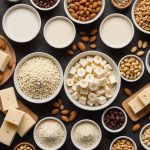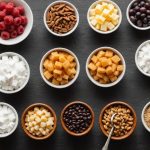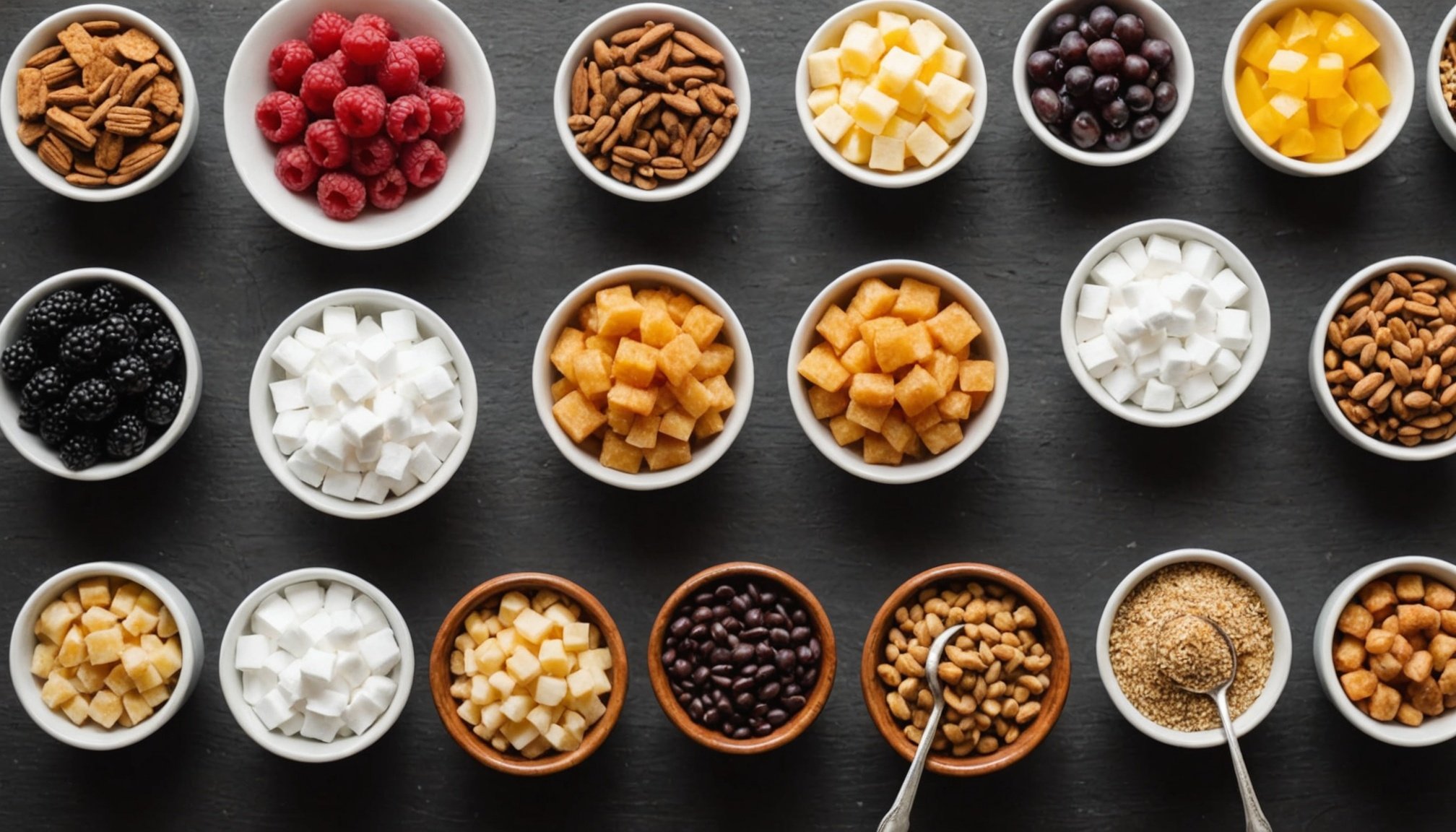Understanding Sugar Intake
In today’s diet, sugar consumption is not just an indulgence but an integral part of everyday meals. To navigate the intricacies of sugar’s role in health, it is essential to differentiate between naturally occurring sugars, like those in fruits and honey, and added sugars, which are prevalent in processed foods.
Statistics from recent studies indicate that UK adults consume significantly more sugar than recommended by dietary guidelines. Currently, the average intake surpasses the suggested limit by a formidable margin, posing various health concerns.
Also read : Essential strategies for uk parents to cultivate healthy sleep habits in children
Health Risks of High Sugar Intake
Excessive sugar intake is linked to a myriad of health risks. Among the most alarming are the increased chances of developing obesity, type 2 diabetes, and heart disease. Furthermore, excessive sugar can lead to tooth decay and other dental issues, escalating the public health burden.
Understanding these risks is crucial as it underscores the importance of adhering to UK dietary guidelines, which advocate for reducing added sugar to protect overall health. By making informed dietary choices, individuals can mitigate these risks effectively, paving the way for a healthier lifestyle.
Also read : Ultimate guide to calcium-packed non-dairy foods for lactose-intolerant people in the uk
Recognizing Hidden Sugars
In today’s world, identifying hidden sugars in daily foods is pivotal for maintaining a healthy diet. These sugars often lurk in unexpected places like salad dressings, sauces, and even savoury snacks. They can significantly contribute to one’s daily sugar intake without being immediately obvious.
Understanding food labeling is an essential skill in this endeavour. Labels might list sugars under different names such as sucrose, glucose, corn syrup, or fructose. Being able to recognize these terms helps consumers make informed choices and avoid unnecessary sugar consumption.
In the UK, finding healthier sugar alternatives is a growing trend. Options like stevia, xylitol, and erythritol offer sweetness without the excessive calorie burden. These alternatives can be used in baking or cooking, making it easier to cut down on traditional sugar use.
Ultimately, being able to find and recognise hidden sugars within a diet is achieved by careful observation of food labels and understanding of ingredients. Switching to healthier sugar substitutes is a proactive step towards reducing overall sugar intake and enhancing health.
Practical Tips for Reducing Sugar Intake
Reducing sugar intake is a manageable task with practical adjustments in daily life. Small changes, particularly in beverages, can significantly lower sugar consumption. Opting for water, herbal teas, or black coffee instead of sugary sodas or juice can cut unnecessary sugars.
When it comes to snacks, replace items like pastries and candy with healthier options such as fresh fruit, nuts, or yogurt. Planning meals with a focus on fresh, whole foods rather than processed ones also minimizes added sugars.
Meal planning becomes pivotal in managing sugar intake. Incorporate ingredients rich in nutrients, such as lean proteins and vegetables. Avoid processed goods that often contain hidden sugars. Using herbs and spices instead of commercial sauces enhances flavour without adding extra sugar.
Engage in healthy swaps: choose whole-grain bread over white, and sauces made from pureed vegetables over sugar-laden alternatives. When preparing traditional meals, modify recipes by reducing sugar, substituting sugar with sugar alternatives like stevia or xylitol.
These practical tips, involving conscious choices and substitutions, empower individuals to decrease sugar consumption effectively. This proactive approach supports adherence to UK dietary guidelines, improving overall health.
Cultural Considerations in Reducing Sugar
The role of UK food culture in dietary habits is significant, with many traditional meals often being high in sugar. Common dishes such as trifles, sticky toffee pudding, and various sauces can contribute greatly to sugar intake. However, modifying these foods is possible without losing their essence. Adjust recipes by using sugar substitutes or reducing the quantity of sugar to create healthier versions.
Cultural preferences strongly influence how dietary changes are approached. People may resist altering their favourite traditional dishes due to perceived loss of authenticity in taste. Hence, promoting gradual modifications, like substituting part of the sugar with alternatives such as honey or zesty fruits, can make the shift more palatable.
Enjoying traditional foods with reduced sugar content can be encouraged by employing smart strategies. For instance, incorporate more naturally sweet ingredients like berries or apples in desserts. Use spices like cinnamon or nutmeg to add flavour while maintaining cultural authenticity. These approaches facilitate maintaining the beloved aspects of UK cuisine while making it healthier.
Balancing traditional tastes with health-conscious choices requires creativity and openness to change, ensuring that cultural heritage continues while also fostering better eating habits.
Resources and Tools for Better Eating
Embarking on a journey towards healthier eating can be facilitated by leveraging several effective resources and tools. Tailored meal plans are a practical starting point, guiding individuals in maintaining a low-sugar diet without sacrificing taste or nutrition. These plans usually emphasize the holistic integration of whole grains, lean proteins, and an abundance of vegetables.
Accessing diverse sources of healthy recipes greatly assists in meal preparation. UK-based platforms and cookbooks offer inventive ways to cook traditional dishes with a modern, health-conscious twist. Experimenting with recipes that use natural sweeteners or increased vegetable content can diversify a cooking repertoire drastically.
Support is essential in achieving dietary changes, and various community resources are available. Join online forums or local groups where experiences and successful strategies for reducing sugar are shared. Digital tools like mobile apps enable convenient tracking of sugar intake, offering personalised feedback and motivation.
By combining these resources and tools, individuals can navigate their dietary shifts more confidently and effectively. Embracing these supports makes the transition towards a healthier lifestyle not just feasible but enjoyable, encouraging lasting change.
Success Stories and Expert Opinions
Hearing success stories from individuals who’ve effectively reduced sugar intake can be a powerful motivator. Take Sarah, a 35-year-old from London, who cut her sugar consumption by half. She initially swapped sugary drinks for herbal teas and started cooking with more whole foods. Within months, Sarah reported more energy and improved focus.
Nutritionists provide invaluable expert advice on sustaining these changes. They highlight that understanding the difference between natural and added sugars and recognising hidden sugars can drastically lower sugar intake. Experts also suggest making gradual, manageable modifications to ensure long-term adherence to a lower sugar diet.
The long-term benefits of maintaining reduced sugar consumption are compelling. Individuals often find improvements in metabolic health, weight management, and reduced risk of chronic diseases such as type 2 diabetes and cardiovascular issues.
Additionally, successfully maintaining a low-sugar lifestyle often encourages lifestyle changes in other areas, fostering a holistic approach to health. The integration of healthier choices in eating habits positively impacts overall well-being, making the initial struggle worthwhile. Positive outcomes, combined with expert guidance, enable many to maintain these beneficial habits.











